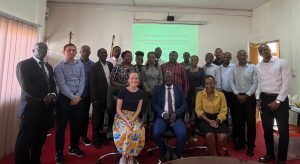Uganda’s National Data Strategy (NDS) development initiative is a critical step toward transforming the nation’s data ecosystem. Stakeholders from various sectors have engaged in constructive one-on-one discussions, identifying key challenges and opportunities. This policy brief provides an overview on the development of the NDS and recommends strategic actions to enhance data management and utilization in Uganda.
Introduction:
The NDS development initiative aims to address challenges and also harness opportunities within Uganda’s data ecosystem. Key concerns include inadequate capacity to utilize and innovate with data, a lack of a comprehensive data governance framework, un-standardized data formats, issues with data discoverability, accessibility, interoperability, and other insucient enablers such as connectivity. To capitalize on the opportunities and address these concerns, stakeholders must work together to formulate eective policies and strategies. In an eort to achieve this unity, Ministry of ICT and National Guidance with support from United Nations Global Pulse Uganda reached out to about nine key stakeholders (MDAs)— directly working in data governance or utilizing data for service delivery — in a one-on-one engagement between 7th and 11th of August 2023,in an inclusive effort of enriching recommendations for the development of the National Data Strategy
Key Recommendations:
- Standardize Data Formats and Establish Data Standards:
● Develop a framework for standardizing data formats across sectors.
● Create clear data standards to ensure data quality and interoperability. - Promote Data Excellence:
● Implement initiatives to enhance data creation and records management practices.
● Invest in capacity building and technology infrastructure to improve data management. - Foster Collaboration and Inclusivity:
● Encourage cross-sector collaboration and information sharing.
● Ensure that the NDS is developed through an inclusive approach, involving all relevant
entities. - Sector-Specific Recommendations:
● Ministry of Public Service: Leverage existing record management systems and
harmonize data standards.
● Ministry of ICT and National Guidance: Balance digitized and non-digitized data
strategies, prioritize governance, and raise data awareness.
● Personal Data Protection Oce: Collaborate with journalists, update policies, assess
data platform impact, and plan for National Personal Data Day.
● Ministry of Health: Bridge data gaps caused by fragmented data collection and review
institutional data-sharing policies.
● Uganda Bureau of Statistics: Ensure the NDS manages expectations, defines its
administrative framework, aligns with legal guidelines, and addresses data quality
concerns while considering support for UBOS in obtaining satellite imagery.
● National Planning Authority: Consider the establishment of a centralized data hub and
address data security concerns.
● Uganda Communications Commission: Promote innovation and actionable solutions to
make the NDS practical and user-centric.
● Ministry of Science, Technology and Innovation: Facilitate the transition to a digitized
economy and establish consistent data definitions.
Implementation Strategy:
- Establish a dedicated task force responsible for overseeing the NDS implementation
- Allocate necessary resources for capacity building, technology infrastructure, and
awareness campaigns - Develop sector-specific action plans aligned with the NDS goals
- Foster partnerships with international organizations such as the African Union for
technical support and best practices sharing
Conclusion:
The development of Uganda’s National Data Strategy presents an unprecedented opportunity to transform the nation’s data ecosystem. To maximize the benefits of the NDS, stakeholders must collaborate closely and implement the recommended strategies. By standardizing data formats, improving data management practices, fostering collaboration, and tailoring sector-specific solutions, Uganda can pave the way for a more ecient and inclusive data ecosystem, ultimately driving progress and development.


